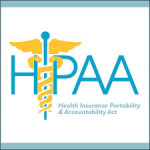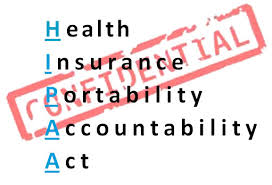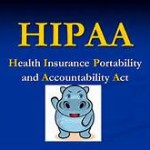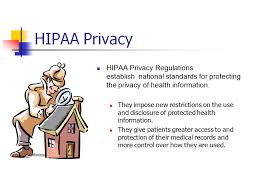HIPAA: WHAT IS IT?
According to MedTerms medical dictionary, HIPAA is an acronym for Health Insurance Portability and Accountability. Ironically, I always thought that the “P” stood for the word “protection,” but I was wrong. Actually, it is a law designed to provide privacy standards in order to “protect” patients’ medical records and other health information. This law, developed by the Department of Health and Human Services, pertains to health plans, doctors, hospitals, and other health providers. The law became effective on April 14, 2003, and supposedly provides uniform regulations for privacy “protections” to consumers—like me. I have cerebral palsy. My private information exists in many doctors’ offices and medical facilities throughout San Diego, as well as in schools, day programs, social services organizations, and other places.
DOES IT HELP US OR, DOES IT HURT US?
So, how is this law working for most of us? Well, the year 2003, or shortly thereafter, might actually have been the time that someone took my social security number from a confidential file (I believe it may have been stolen from my school when social security numbers were required to be included on the front page of IEPs (Individual Education Plans.) I also worked in the office at my high school for a while where I was paid a small amount under the Workability Program, which program I believe no longer exists. After I turned 18, and my parents took me to the Social Security office, we learned that some female identity thief was working at McDonalds in Arizona, using my Social Security number. I still cannot access my own credit report; the records have been flagged (locked) by unknown persons. My mom and step-dad have expended countless hours and frustration, trying to solve this problem, but no one will talk to us. All resources on the internet seem to lead to no where. The police laughed at my mom when she called to see if the police report had been followed up upon. The officer advised my mom that there are hundreds of these reports each day. If we do succeed in unfreezing my credit report, I continue to be a sitting duck for dishonest people to steal my information over and over again. Every dentist office, chiropractor, day program, virtually most facilities, ask for our social security numbers and even driver’s license numbers on office paperwork. What is to protect any clerk from recording our information? My mom and I seriously feel that the HIPAA law hurts more people than it protects. Here is how:
HOW HIPAA HURTS DISABLED CONSUMERS:
Example #1. On several occasions, we have requested that my medical records be sent from one medical facility to another. I have a huge file beginning from my birth at Children’s Hospital. My mom wrote multiple times, using the proper request for information form required by HIPAA. She followed up with phone calls. The records NEVER arrived.
The same thing happened when my mom requested records from a former eye surgeon. She wrote multiple times. The new doctor never received the records. It happened at another medical facility recently. Offices use the HIPPA law as an excuse not to have to do the work. The first time she wrote, my mom received a letter advising that she did not use the proper HIPAA form. This is not true because she did use the correct form, and the HIPAA citation and date were at the bottom of the form. She downloaded the form from the facilities’ website. She filed the request again. She later received a letter from medical records, saying that the request was not specific enough. When we wrote again to clarify the request, there was no follow-up by the office. It was just a paper trail to make it look like we did not make a proper request. Again, my file is large and no one wanted to do that work. So now my new doctors will not be fully informed of my condition in order to do their jobs well for my health. It makes me feel unimportant because I am handicapped. It makes me feel sealed off from access to vital assistance in life.
The HIPAA law has hurt me by preventing me from clearing my own credit report after it failed to protect me from identify theft. And it gives medical offices and other facilities an escape route from honest work that is needed to protect patients and consumers.
Example #2. I have a friend named Mark who I have written about in a former blog. Mark is not his real name. This friend has many problems. He has mild disabilities, but he is very high functioning. In the past, an uncaring and unethical care provider stole his money by using her close position to him in order to gain access to his passwords and checking account information. HIPAA did not protect him, and his crisis team left him alone to deal with the matter in court where he was held to the standard of a non-handicapped person. So he lost the case since he failed to make the burden of proof.
Later, Mark also suffered from abuse in more than one foster home and group home. Yet, when he appealed for help from the agency in charge, sometimes he was not believed because of his handicapping condition, or the caseworker involved failed to record the facts accurately regarding the situation. My mom and I both overheard an incident of abuse at one of the group homes when we happened to be talking to him while using the speakerphone. We both heard the group home owner pounding on Mark’s door and cursing at him. Yet, because of the HIPAA law, no one would talk to us about him or the proof that we heard regarding his situation. Since he has no biological parent to advocate for him, my mom has tried to help him. He has asked us for help many times, yet the agency in charge continues to refuse to talk to us.
He went from that abusive group home to multiple hospitals, then, to nursing facilities when the stress became so great that he began having seizures or panic attacks as my mom was told. My mom could have helped him. She wanted to speak with the doctors to make sure that he was given the right medications since she knows a lot about seizures meds, having gone through it all with me, and the different doctors did not know him or his former medical issues. Still, she was prevented from being involved in his care due to the HIPAA law—even when Mark requested that she be involved!
A job coach from a day program recently hit Mark. My mom wanted to make sure the facts were accurately reported and that a consequence would result for the incompetent day program, where I had also experienced negligent care, but again, no one would speak with her. We were prevented from reporting or reading any reports or information regarding the incident. We know his behaviors may not always be perfect. He is handicapped, but he is a sweetheart, kind and intelligent. He does become frustrated sometimes because he has no control of his life.
The HIPAA law seems to prevent concerned people from helping those in need, even when the person involved needs and asks for help. How is this law providing protection for this consumer?
Example #3. The same scenario occurred with my good friend, Sarah, who I also wrote about in the same former blog. Again, Sarah is not her real name. My mom has been trying to help Sarah for years, but the same agency prevents us from helping, even when Sarah begs for our help. Recently, she was left in a nursing home for almost five years. Alzheimer’s patients primarily live there. In all the times we visited her there, we never saw one young person staying at this nursing home. Sarah’s health had been ruined in a previous neglectful group home, and she was placed in this nursing facility to improve her health, but her health continued to get worse as no reasonable standard of care was given to her. She had blood clots, bed sores, breathing issues, and extreme weight gain. She was required to wait for inordinate amounts of time when she called for help to use the restroom, frequently being forced to go to the bathroom in her clothing. Two much-needed surgeries were cancelled and never resumed because the head nurse and doctor failed to read her previous medical record. Good HIPAA protection! Over and over again, Sarah begged for our help. Neither the nursing home, nor the “agency” would take my mom’s calls, with few exceptions. One nurse did speak with my mom. Unfortunately, the turn over in staff at this place was so frequent that social workers and nurses left before my mom could follow up with them, and the new staff would refuse to speak with her, invoking the HIPAA law.
Finally, Sarah succeeded in moving out of this nursing facility. Then we lost her. She called us one night with the news that she finally had moved to a new group home. We were late for an engagement and could not talk long at that moment, but we promised to call her back the next day. Somehow I accidentally deleted the phone number from recent calls in my cell phone. Now, we had no way of contacting her; this was a new cell phone number. Sarah changed numbers often when she didn’t have enough money to pay her bill. When this happened, we would call to speak with her at the nursing home, but she was no longer there. We called the nursing facility at least five times to find out where she went. They acted like they did not know who we were and cited the HIPAA law to deny us information. My mom had attended meetings on Sarah’s behalf and at her request. My mom knew the names of the social workers, the head nurse, Sarah’s day program supervisor and service worker. Yet, no one at this facility would acknowledge that my mother was an approved person to receive information regarding Sarah.
Mom called the day program, but the owner was a rude and haughty man who said he couldn’t help us, and we were not demanding that he tell us where Sarah is, but simply that he or a staff worker call Sarah and let her know that we had lost her number and could not call her. He would not help. I know the HIPAA law does not say that he could not call her and relate this information to her. He just used the law as an excuse to get off the phone–such a busy, important man, you know.
We also called Regional Center, which agency returned no phone calls either. Sarah’s social worker at RC knows exactly who we are because she sat at a conference table with my mom at Sarah’s meetings. Yet, this social worker did not have the courtesy to return my mother’s calls in order to help her own client, Sarah! She does not care how her client feels being isolated from her best friend, and she certainly did not care how I felt at not being able to find my good friend.
The HIPAA law gives agencies license to ignore important communications that could help their clients.
We were heartbroken and desperate to find Sarah. We thought perhaps she had even died because her health had declined so much, and she had been hospitalized a few times. How uncaring all of these agencies are!
Sarah called to wish us a happy Christmas. We rejoiced! We wrote her number everywhere. She seems happier now in her new home. But it breaks my heart to think of how she has suffered and how lonely she must have been with wondering why we didn’t call her. Agencies go too far with the HIPAA law, using it as an excuse to ignore people to save work for themselves at the expense of their patients and clients.
IMPLICATIONS FOR THE FUTURE:
I wonder if one day I will somehow lose contact with friends and family after my parents are gone. Will friends try to find me but be refused information regarding my location while social workers and service providers invoke the HIPAA law? I am afraid for my future. But at least we all receive these valuable disclosure statements in the mail, day after day—tons of paperwork, killing many, many trees—thanks to the HIPPA law. Another wonderful bit of legislation passed by our hard working Congress–so just like the do-not-call law. How is that working for us? Don’t you love those early morning calls on your day off to sell you things you don’t want or need?
Readers, thank you for reading! Please write your representatives and congressmen and encourage them to rewrite this law so that it is meaningful and actually helpful to consumers. Please forward and share this blog to others to help spread awareness for people with disabilities and others who are affected by misuse of the law. Also, I know this blog represents my opinion based upon my experiences and those of some of my friends. Please write your comments on this blog. Let us know how the HIPAA law has affected you and your family and friends. In an effort to include positive experiences, it would be helpful to present all sides and perspectives.
Thanks again for reading Issues of the Disabled. Thank you for caring!





wow very nice blog
Thank you, Ben! Hope you are sharing my blogs with your friends and family. Take care. Talk soon.
very interesting
First,I’m so glad Sarah called you and you have her number again. Must have worried you to not know what had happened to her.
I’m glad you wrote this article Jaime. I had no idea that HIPPA had all these restrictions.
Thank you, Olivia! Yes, we did finally find her, but it was scary for all of us for awhile. Thank you for reading and sharing. Hope to see you soon. Jaime Rae
Jaime,
Thank you for all the information you wrote down. I have known some of the issues but it doesn’t take long to see where this HIPPA law leads. Can we refuse to sign the law when we are at the doctor? If not then our freedoms are going down the tubes, as I already know. I will pass this information on.
Love you!
Thank you, Aunt Colleen! Refusing to sign it is not really beneficial. This is just the required useless paperwork that offices are required to give as a result of the useless HIPPA law. That is why we have so enthusiasm about voting for senators and congressmen. They spend so much of our money, and they get paid so much in wages an benefits, but the laws usually end up being a waste of time, like the Do Not Call law. Our phone rings all day because everyone sells our phone number, and then they can say that they are an affiliate of someone. It’s all ridiculous. Thanks so much for commenting though. I appreciate it. Love you!
Excellently written, Jaime. I was not aware of the HIPAA law until now, and am horrified at the way it is being used as an excuse to abuse helpless people, with no fear of being caught. The irony of your thinking the P stood for Protection, is that is does…It apparently protects the guilty! This law definitely needs further investigation and exposure for its mockery of human rights and the rights of the disabled. Thank you for bringing it to our attention.
Thank you, Lalchumi! I just finished removing 81 comments of pure irrelevant junk, so it was nice to find something written by someone who actually read the text. I appreciate the time you took to comment too. Take care. Jaime Rae
Just read your latest blog on HIPAA. What a revealing editorial. I am thinking that you could condense it and send an editorial to appropriate newspapers or magazines where it will get more readers who might respond thereby getting more attention to it. Have you sent it by e-mail to the appropriate level of government? Your blog is a first step, but going the next step to get more advocacy would be a good idea.
Thanks, Marlene. I will follow up as soon as possible as an editorial and to government representatives. This will require much research and work. Thanks for your comment. I had to wade through many, many before getting to one relevant remark. Thanks again.
This is acting as if I didn’t reply to your comment, so I am writing again to thank you for reading and commenting on my blog. Yes, I should write an editorial and send it on to government officials. I did do that with some of my other blogs, but got no feedback. It is frustrating and a time consuming, so that is why I am asking for help of readers to follow up as well.
Hi Jaime,
I was just reading Marlene’s comment and think we should follow-up by writing to legislators about how useful and potentially harmful the HIPPA law is as it is currently written. Surely, our representatives know it too. How can they be proud of the laws they write when most of them end up useless and wasteful of all human effort?
Thanks for writing about this. I have adult children with disabilities and this law has been used again and again to our disadvantage as well. It has isolated us more than necessary. At one of my son’s schools we were not allowed to take photos at school events due to HIPPA. Parent’s didn’t get to know each other out of fear of this law.
There are good parts to the law. The parts that ensure you are allowed to keep insurance when transitioning jobs, that medical coding be consistent throughout the country, etc…
I am curious – is there any sort of movement yet to amend this law to be less rigid, especially for the disabled population?
Thanks again. Good blog!
Thank you for your thoughtful and relevant comment. I do not know if any moves are being made to modify this law. I am a student trying to catch up on all the help I was supposed to get but was kept from due to programs for the disabled which mostly pretend that they are doing what they are supposed to do. Sorry for being so cynical, but I have been through three day programs that did not work on my goals and one which actually prevented me from making friends at my ability level. It is all about making money for the program; therefore, sufficient staff are not hired. I was always grouped homogeneously, which sometimes ensured my safety, but not my social and academic growth. My mom takes my ideas and helps me write the blog. We once tried to reach out to senators, assemblymen, etc., but never were able to gain attention. They want you to promise your support. . . .give vague statements. . . .there isn’t enough time. I would join an effort for reform, but do not feel empowered to do so on my own beyond my blog. Again, thank you for your support, and please feel free to contact us again.